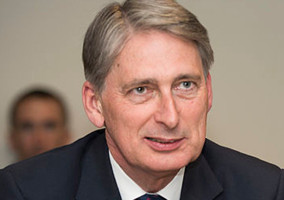Charity infrastructure bodies got very little of what they had asked for ahead of the budget. Key targets were funding for the Charity Commission, reform of VAT, and strategic use of dormant assets. Cause-focused charities were angry about silence on key areas that affect their beneficiaries, and said many of the government’s announcements did not go far enough. In particular, a resolution to the crisis over funding for sleep-in shifts did not materialise.
Infrastructure
NCVO: ‘Next few years will be tough – the need will rise’
Karl Wilding, director of public policy and volunteering, said the overall message was that the “next few years are going to be a tough economic environment for charities. We need to hang on in there. Lower than expected productivity means the state has less to spend on the services the public need. Average earnings are set to fall. Despite a small relaxation of the public finances, it’s likely charities are going to be facing higher levels of need for what they do.”
He added that while it “was not a budget with much to say about the voluntary sector. Or social enterprise. Or volunteering. There are clearly large swathes of the budget that will impact on charities” such as the housing market and reform Universal Care.
He said some sectors, such as social care “have been ignored” and in “some senses our sector not on Hammond’s radar, but on the issues we campaign on it was more of a mixed bag.”
Wilding added that the implications of some aspects of the Budget may not be fully understood for a few days. “Small things like changes to employee expenses might end up being time-consuming for people trying to run their charity.
He concluded that: “Now is the time for longer term thinking. The absence of big changes on charity tax, or strategic interventions to strengthen the sector, leave many feeling ignored.
“Yet there are a number of wider reviews now under way or about to start: NCVO’s charity tax review; Julia Unwin’s review of civil society; and the development of a civil society strategy by DCMS. We need to contribute our ideas to these reviews now and distil from them proposals for a better tax system and a new sense of where and how government can intervene to support our sector, supported by targeted spending.”
Charity Finance Group: ‘This is backward looking’
Caron Bradshaw, chief executive of the Charity Finance Group, said: "For a government looking to the future it was disheartening to only hear references to business and physical infrastructure. This is backward looking, because our future prosperity comes from having strong communities which charities help to create.
“Bricks and mortar is fine, but real growth comes from sustainable communities where people want to live. We need to put our role at the centre of the economy and society in front of politicians, so that public investment benefits everyone. It is too early to say whether Gift Aid donor benefit rule changes will help or hinder the sector, and we'll need to read the fine detail closely."
Acevo: ‘This was a tepid budget’
In a statement Acevo said: “This was a tepid budget. There were some welcome announcements. The continuing review of the flexibility of the apprenticeship levy, an acknowledgement of the acute problem of homelessness, the additional exceptional £2.8 billion for the NHS, the helpful announcements on business rates and changes to the administration of Universal Credit all go some way to relieve pressure at the edges.
“But they fall a long way short of addressing the strategic needs of civil society, particularly social care. This was not a budget which reflected the recent statement by the minister for civil society Tracey Crouch who asserted that the Government values civil society and the vital role it plays.”
Social Enterprise UK: ‘Tinkers around the edges’
Peter Holbrook, chief executive of SEUK, said: “This Budget tinkers around the edges and is not nearly as ambitious as we had been led to believe. The Chancellor has not recognised that the structure of the economy and business itself must change to deliver the prosperous and inclusive economy he says he wants. Disappointingly, the government has not announced a review of public sector procurement. Much of the government’s remaining credibility now rests on next week’s industrial strategy which must deliver radical change.”
Locality: ‘The government has few answers’
Locality, which works with local community organisations, said that the Budget suggested the government has “few answers to meet the scale of the challenge”.
Its statement added: “But while Westminster struggles to get a grip and offer clear direction, all across the country, enterprising communities are getting on with the business of solving their own problems and driving their own neighbourhoods forward. We believe that the key task for the government is to harness this ‘power of community’ and create a more supportive environment for the community organisations to do what they do best.”
Power to Change: ‘Government needs to go further’
Vidhya Alakeson, chief executive of Power to Change, said: “It is encouraging to see that devolution is not dead and the new £1.7bn Transforming Cities Fund is a welcome announcement, but the government needs to go much further. Power and funding must be driven all the way down to communities so that local people can be part of the solution in helping tackle the decline in local economies and entrenched regional inequalities.”
CAF: ‘Government should look at using other regulatory charges or fines to support good causes’
Sir John Low, chief executive of the Charities Aid Foundation, said: “It’s good news that the Chancellor will explore levies on single-use ‘plastic items’ through the tax system. The plastic bag levy has dramatically cut the number of bags being used and raised £29m for good causes in the first six months of the levy - £10m of which was distributed through CAF – and a similar scheme could reap similar benefits.
“We welcome the news that a further £36m of banking fines will support armed forces and emergency services charities, and that there will be a grant will to help accident rescue charities meet the cost of normally irrecoverable VAT. The government should look at using other regulatory charges or fines to support good causes, offering those who have acted improperly the chance to turn it into something good.
“Plans to ensure safe, ethical and ground-breaking innovation in AI and other technologies could benefit charities if they are supported to develop the right skills. In our recent evidence to the House of Lords, however, we noted that charities also have an important role to play as ethical guardians against the potentially negative social consequences of technological change.”
IoF: 'Need for a step-change in the support offered for charities'
Peter Lewis, chief executive of the Institute of Fundraising, said: “We welcome today’s simplification of the gift aid donor benefits rules, which we and others called for, and the additional allocation of the Libor fines. These are positive steps in a Budget that on the whole was focussed on other priorities.
“There is still a real need for a step-change in the support offered for charities playing a vital role in our communities, especially in raising the funds they need and promoting measures that could grow charitable giving and philanthropy across the country. We are optimistic that future announcements, in particular the forthcoming strategy for civil society, will bring forward the policies needed to support and grow the work of Britain’s charities.”
DSC: 'Missed opportunity'
Daniel Ferrell-Schweppenstedde, policy and public affairs manager at DSC, said: "It is bizarre that the Chancellor has missed this chance but it is crucial that Government engages charities, philanthropy, social enterprises and voluntary action in a dialogue on how to create a post-Brexit society. Clarity on the future of EU funding and a soundly designed Shared Prosperity Fund could be just a stepping stone in a wider process of empowering communities, inspiring civic activism and spurring local growth."
Campaigning charities
Oxfam: ‘Does not go far enough’
Oxfam said the Chancellor did not go far enough on universal credit or tax measures.
Head of UK programmes, Rachael Orr, said: “Whilst the Chancellor has recognised the need to act, cutting the waiting time for Universal Credit down to five weeks is not enough to protect people from hunger and hardship. Extremely vulnerable people will still be left for over a month with no means to get by, unless they apply for an advance payment which they have to repay.
“The government has to make sure that a system which should be protecting people from poverty isn’t causing people to go hungry.”
Head of Inequality, Rebecca Gowland, said: “Despite announcing plans to try to ensure tech companies pay their fair share in the UK, the Chancellor has missed the mark on tax transparency. His failure to take further action on ending tax secrecy is a huge missed opportunity to prevent tax avoidance that deprives the UK and developing countries of vital funds that could be used to fight poverty.”
MS Society: ‘Huge disappointment’
Michelle Mitchell, chief executive of the MS Society, said: “This Budget will come as a huge disappointment to people with MS. The additional NHS investment, while welcome, falls far short of the extra £4bn a year health leaders say is needed. This risks undermining not only recent exciting developments in MS treatments, but also quality and access to NHS services.
“The fact there is no more money for social care is even more alarming, and provides nothing to prevent the current crisis from worsening. The system desperately needs money now. Already one in three people with MS are struggling without the proper care they need.”
Mencap: ‘Silent on the sleep-in crisis’
Jan Tregelles, chief executive of Mencap, said: “This Budget that claimed to be investing in Britain’s future and that ‘cares for the vulnerable’, will leave many people with a learning disability, their families and care workers wondering if this is a government that really cares about them.
“The sleep-in funding crisis, caused by faulty government guidance on overnight shift payments, cannot be ignored any longer. A new enforcement process is no substitute for a funded, responsible solution.
“Government must urgently make clear its intention to provide critical financial support for providers, who were simply delivering, local authority commissioned care services.”
United Response: 'Reminiscent of the dog that did not bark'
United Response also criticised the Budget for not addressing issues around the sleep-in crisis.
Tim Cooper, chief executive, said: “Today’s Budget was reminiscent of the dog that did not bark: singularly silent on how the government will avert the funding crisis enveloping services for people with learning disabilities.”
He added: “The Chancellor’s failure to address either the immediate funding gap that it has created around ‘sleep-in’ shifts or the longer term funding of services for people with learning disabilities, is deeply worrying.
“Through this Budget the government continues to assume that it can fund the retrospective liability for sleep-in shifts largely by raiding the charitable reserves that organisations like United Response have prudently accrued. It provides no relief for providers, local authorities and disabled people on personal budgets, who are compelled to find £400m retrospective liability for care staff, despite this situation being created by Government’s own ambiguous guidance and funding failures.”
Child Poverty Action Group: ‘Needed structural reform’
Alison Garnham, chief executive of CPAG, said: “We’re pleased the Chancellor has acted to remove [waiting days for universal credit] and put in place new arrangements for receiving advances as part of an emergency rescue package, but this should have been the Budget that ushered in much needed structural reform of universal credit to revive the central promise to strengthen the rewards from work and that didn’t happen.”
Scope: 'Huge issues' remain with Universal Credit
Mark Atkinson, chief executive at Scope, said: “Huge issues remain with Universal Credit for disabled people.
“Since its introduction we have seen an increase in calls to our helpline. Disabled people who call us are afraid, tearful, and in need of more reassurance. They are worried about the destitution that Universal Credit is bringing.
“If Universal Credit is to have a major role in helping the government get more disabled people into work, the distress it is causing cannot be ignored any longer. The government must focus on fixing the issues that impact on disabled people.”
Action for Children: ‘Demand is growing’
Action for Children’s head of policy and research, Eleanor Briggs, said: "Children up and down the country are missing out on the help they and their families need, but we have heard nothing in today's Budget that indicates help may be on the way.
"We know the gap between demand and resource for children's services is growing. Since 2010, funding has fallen by £2.4bn while the number of child protection investigations has more than doubled. Failing to invest in early help and prevention services will only see this situation get worse, costing the government even more in the long run.
"But today there was silence on this situation when what we needed to see was action. If the Government is to deliver effective help for children and families, ministers must take the lead and ensure councils receive the funding they need to invest in early help and stop problems escalating to crisis point."
Related Articles












